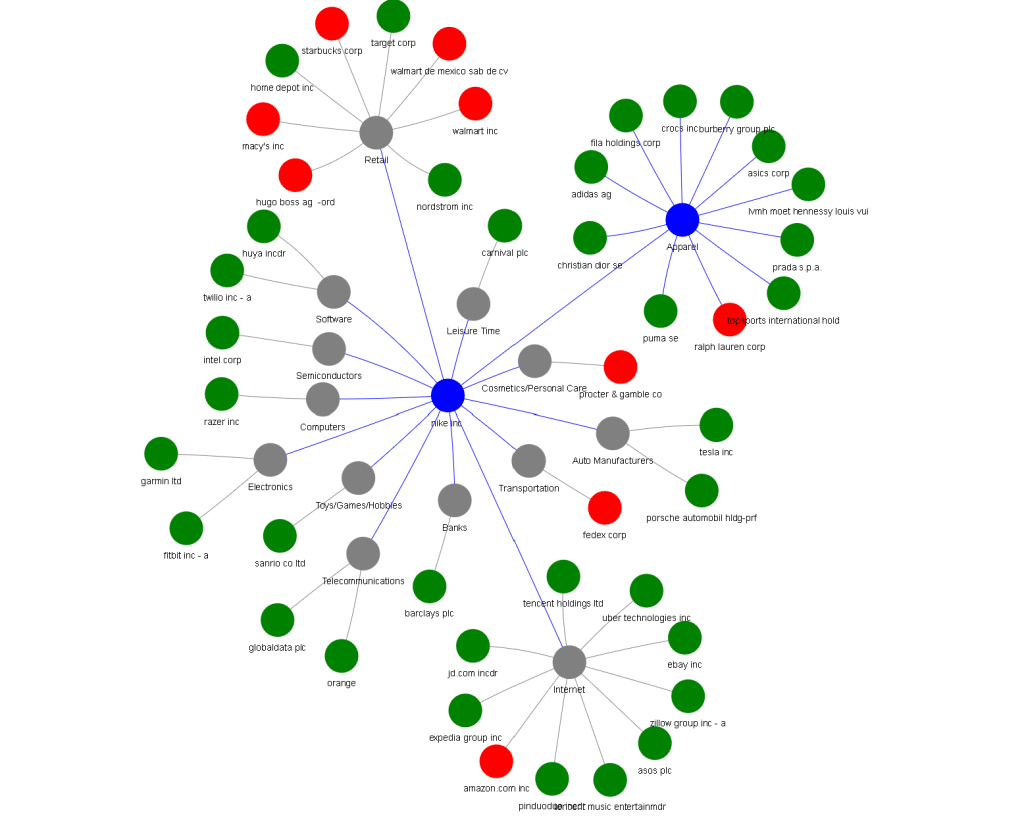Nike, the global leader in the sportswear industry, has established itself as a powerhouse brand through its innovative products and successful marketing strategies. However, behind the scenes, Nike’s success is also attributed to its strong supply chain relationships. In this article, we will delve into the dynamics of the Nike supply chain relationships, exploring their importance, key partners, collaboration and communication strategies, challenges, and solutions. By understanding the intricacies of these relationships, we can gain valuable insights into how Nike has managed to build a robust and efficient supply chain network.
Importance of strong connections in supply chain management
In the fast-paced and competitive world of supply chain management, establishing strong connections is vital. Strong relationships between Nike and its suppliers, manufacturers, distributors, and retailers are crucial for several reasons. Firstly, these relationships foster trust and reliability, ensuring smooth operations and timely delivery of products. Secondly, strong connections enable effective collaboration and coordination, allowing Nike to optimize its supply chain processes and respond swiftly to market demands. Lastly, by building strong connections, Nike can leverage the expertise and capabilities of its partners, enhancing its own competitive advantage in the industry.
Overview of Nike supply chain network
Nike’s supply chain network is a complex and intricate web involving various entities spread across the globe. At the heart of this network are Nike’s key partners, including suppliers, manufacturers, distributors, and retailers. Nike’s suppliers provide the raw materials and components necessary for the production of its products. These suppliers are carefully selected based on their ability to meet Nike’s quality standards, deliver on time, and adhere to ethical and sustainable practices. Once the materials are sourced, Nike’s manufacturing partners transform them into finished products, ensuring the highest level of craftsmanship and quality. From there, the products are distributed to Nike’s global network of distributors and retailers, who play a crucial role in making the products available to consumers.
Key partners in Nike’s supply chain
Nike’s supply chain partnerships are built on a foundation of mutual trust, shared values, and a commitment to excellence. Nike works closely with its suppliers to ensure a sustainable supply of raw materials and components. By collaborating with these suppliers, Nike can maintain a consistent product quality and meet the demands of its customers. Additionally, Nike actively engages with its manufacturing partners to promote responsible manufacturing practices, such as reducing waste and carbon emissions. Furthermore, Nike collaborates with its distributors and retailers to ensure effective product placement, marketing, and sales strategies. These key partners form the backbone of the Nike supply chain network, enabling the company to deliver innovative and high-quality products to its customers.
Nike supply chain relationships: Collaboration and communication
Effective collaboration and communication are essential for successful supply chain relationships. Nike understands the significance of fostering open and transparent communication channels with its partners. Regular communication helps to align goals, address challenges, and identify opportunities for improvement. Nike utilizes various communication platforms, including online portals and supplier summits, to share information, exchange ideas, and provide updates on market trends and consumer preferences. By fostering a culture of collaboration, Nike ensures that its partners are actively involved in decision-making processes, leading to increased efficiency and effectiveness throughout the supply chain.

Key takeaways from our Supply Chain Network Analysis tool
Our Supply Chain Network Analysis tool provides a detailed visualization of the Nike supply chain network, highlighting the depth and breadth of its most important first order connections across various industries. Here are some critical insights drawn from the network diagram:
Diverse industry connections: The network diagram approved generated through our Supply Chain Network Analysis tool illustrates that Nike is not only deeply embedded within the apparel industry but also actively engages with multiple other sectors. This demonstrates a strategic diversification in its supply chain approach, which helps Nike maintain a resilient operational backbone and a strong market presence.
Prominent apparel links: Nike is directly connected to key players in the apparel sector such as Adidas, Puma, and luxury conglomerates like LVMH. These connections are indicative of a competitive yet interlinked market environment. Such relationships may also facilitate collaborative initiatives, particularly in areas like sustainability and innovation, which are increasingly important in the apparel industry.
Strategic retail partnerships: The diagram underscores Nike’s strategic alliances with major retailers like Target and Macy’s. These partnerships are essential for expanding Nike’s distribution channels, making its products accessible across various consumer segments and geographical markets. This strategy is crucial for scaling Nike’s distribution and enhancing its market penetration.
Logistics and distribution networks: The connection with FedEx highlighted in the network emphasizes the critical role of logistics and distribution partners in Nike’s supply chain. Efficient logistics are key to ensuring that Nike’s products are delivered timely and reliably worldwide, which is vital for customer satisfaction and retention.
Technology and innovation focus: Nike’s links to technology-oriented companies like Intel and Garmin suggest a strong focus on incorporating technological advancements and innovations within its products and operational processes. This connection likely supports Nike’s objectives in enhancing product functionality, improving customer engagement, and optimizing supply chain efficiency.
These insights from our Supply Chain Network Analysis tool illustrate how Nike strategically navigates its complex network to enhance operational efficiencies, foster growth, and strengthen its position as a leader in the global market.
Challenges and solutions in maintaining strong connections
Maintaining strong supply chain relationships is not without its challenges. Global supply chains are susceptible to disruptions, such as natural disasters, geopolitical issues, and economic fluctuations. These disruptions can strain relationships and hinder the smooth flow of goods. However, Nike has implemented several strategies to mitigate these challenges. Firstly, Nike invests in risk management and contingency planning, allowing it to proactively respond to potential disruptions. Secondly, Nike promotes transparency and visibility throughout its supply chain, enabling it to identify and address issues promptly. Lastly, Nike fosters a culture of trust and collaboration, ensuring that its partners feel supported and valued even during challenging times.
Benefits of building strong supply chain relationships for Nike
Building strong supply chain relationships has numerous benefits for Nike. Firstly, it enhances the company’s reputation and brand image, as customers value ethical and sustainable practices. Secondly, strong connections enable Nike to respond quickly to changing market demands, giving it a competitive edge over its rivals. Thirdly, by working closely with its partners, Nike can identify opportunities for innovation and continuous improvement, leading to enhanced product quality and customer satisfaction. Lastly, strong relationships in the supply chain help to create a resilient and agile network, capable of adapting to unforeseen challenges and ensuring the uninterrupted flow of products.
Case studies of successful supply chain relationships in the industry
Nike is not alone in recognizing the importance of strong supply chain relationships. Several other companies in the industry have also forged successful partnerships. One such example is Adidas, which has collaborated with its suppliers to implement sustainable manufacturing practices. By working together, Adidas and its suppliers have reduced waste, water consumption, and carbon emissions, while also improving worker conditions. Another example is Puma, which has established long-term relationships with its manufacturing partners, allowing for better planning, cost control, and quality assurance. These case studies highlight the positive impact that strong supply chain relationships can have on a company’s sustainability and profitability.
Future trends and innovations in supply chain relationship management
As the global business landscape evolves, so too does the field of supply chain relationship management. Several future trends and innovations are expected to shape the industry. One such trend is the increased adoption of technology, such as blockchain and artificial intelligence, to enhance transparency, traceability, and efficiency in supply chain operations. Another trend is the emphasis on sustainability and ethical practices, with companies actively seeking partners who share their commitment to social and environmental responsibility. Furthermore, the rise of e-commerce and omnichannel retailing is driving the need for seamless integration and collaboration across different channels. By staying abreast of these trends and embracing innovation, Nike and other companies can continue to build stronger and more resilient supply chain relationships.
The impact of strong supply chain relationships on Nike’s success
Nike’s success as a global leader in the sportswear industry is not solely attributed to its innovative products and effective marketing strategies. Behind the scenes, Nike has been able to build and maintain strong supply chain relationships, which have played a pivotal role in its success. By establishing trust, promoting collaboration, and addressing challenges proactively, Nike has created a robust and efficient supply chain network. These relationships have enabled Nike to deliver high-quality products to its customers, respond swiftly to market demands, and enhance its reputation as a responsible and sustainable brand. As Nike continues to navigate the ever-changing business landscape, it will undoubtedly rely on its strong supply chain relationships to drive its future success.
Request data on Nike’s supply chain links
Ready to delve deeper into Nike’s intricate supply chain networks? Uncover nuanced data and gain unparalleled insights and supply chain transparency with our data. Elevate your understanding of Nike’s operations, risks and challenges. Request bespoke data tailored to your specific inquiries and navigate the complex web of one of the world’s technology giants by getting in touch below.
Further reading
Found this article useful? Why not read more supply chain insights from us on:
Tesco’s supply chain network and strategic relationships
Coca-Cola supply chain sustainability
